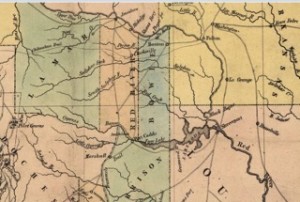
As settlers made their way up the Red River, they encountered huge logjams at Soda Lake and Black Bayou in the Shreveport area. Once they made it safely past Black Bayou, they poled along to the Bend of the Red near present day Fulton, Arkansas and on to Jonesboro in Red River County. It was a treacherous journey but the land in Northeast Texas was worth the journey.
Imagine you lived east of the Mississippi River between 1820 and 1840. You have heard of the fabulous land for sale cheap in a place called Texas. The U. S. Congress recently stopped purchase of unclaimed land on credit. To buy land there, you must pay in cash or gold. You can’t pay cash; who can except the rich planters? After lots of thinking, scheming, and praying, you decide to set out for this Paradise called Texas.
Depending on where you lived and your destination, you might make the trip on riverboat, steamship or sailing ship, or in a primitive wagon. Let’s say you lived in Tennessee along the Tennessee or Cumberland River and you wanted to settle in Northeast Texas. You knew the Wright family who settled in the same area in 1815 and have heard they are quite pleased.
You decided to follow the Wright family’s method of getting to Texas. You built a flat boat, large enough to have a small cabin on deck and space for the kids, cows, and maybe a few horses. You shoved off on the Tennessee or Cumberland, floated to the Ohio River where you drifted into the Mississippi. Each night you tied up to tree on the banks. The next morning you continued your voyage until you reached the mouth of the Red River. The easy part was now over. You began to pole up the Red until you reached the area around present-day Shreveport, where a giant logjam clogged the river. Slowly and carefully you made your way through the logjam and out into the open river again. Soon you reached the bend of the Red, a sharp 90-degree turn. From there you were almost to Texas.
The problem now was to hope and pray for enough water to keep your raft afloat. Soon you reached Pecan Point, the landing site. As you tied up the raft and stepped ashore you saw Texas. If you arrived in the spring of a wet year, you were in for a real treat. It was as beautiful as if you died and went to Heaven.
We are in the midst of springtime with ample rainfall in northeast Texas now. Drive out into the country to see what early settlers saw. The rivers and creeks have water up to the banks, green grass comes to the stirrups of your horse, and it is a virtual dream comes true.
Many of the early settlers in the area experienced such a springtime. But we all know that this weather doesn’t last forever. For several years we have lived through drought conditions, found our gardens wilted from heat and lack of rain. We know that droughts are followed by ample rain and flooding, only to have droughts again. So did the early settlers. Yet, they sent word back to the old states about the beauty of the land and fertility of the soil here.
Somehow, northeast Texas did not have the publicity enjoyed by Stephen F. Austin’s colony. Getting here was difficult, but thank goodness we had brave men and w omen who preferred this area.
